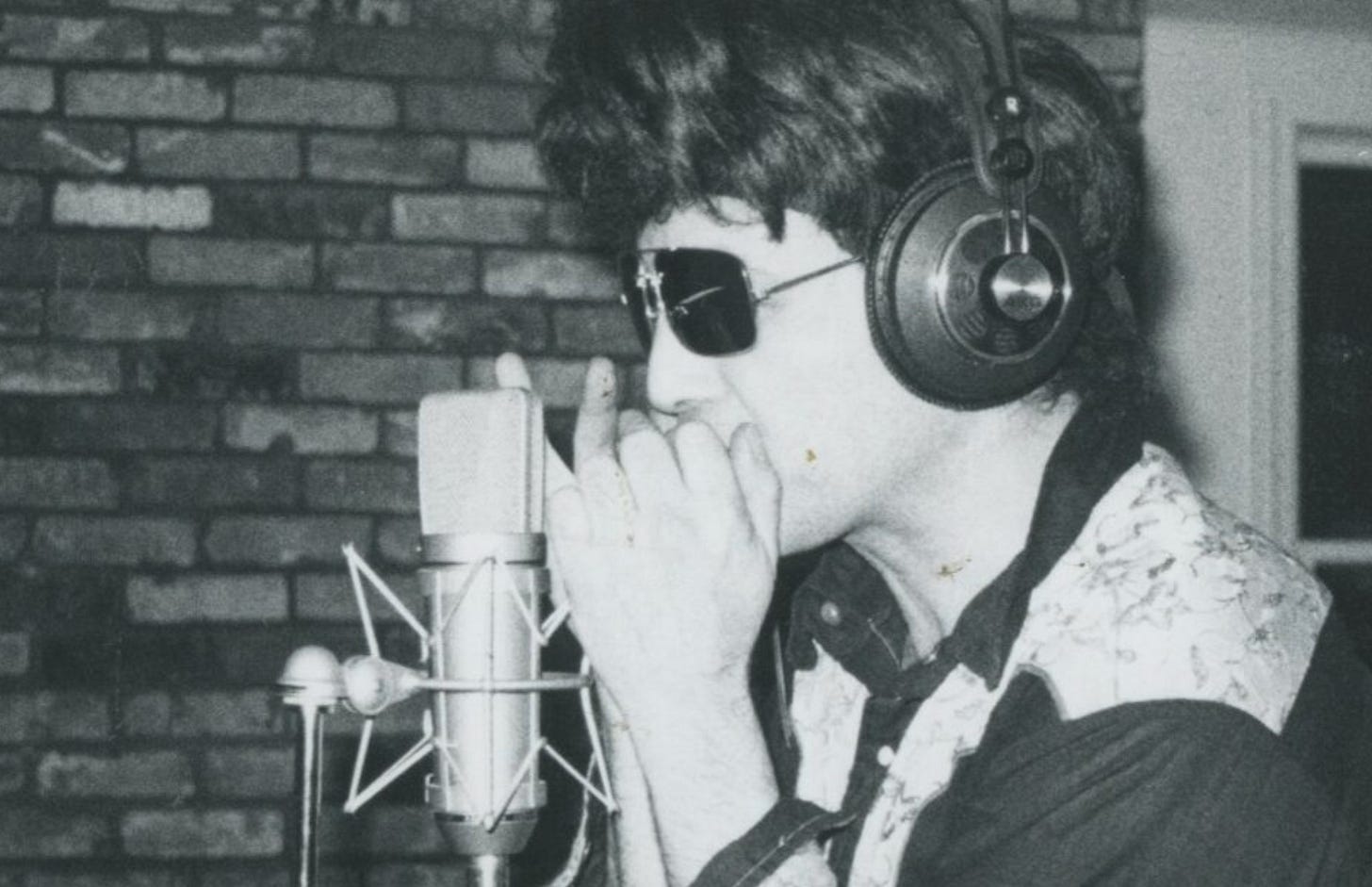Sakamoto's Magical Opus 20240711
“Color is the keyboard, the eyes are the harmonies, the soul is the piano with many strings. The artist is the hand that plays, touching one key or another, to cause vibrations in the soul.”-Kandinsky
I write these words as I watch for the second time the recent film Opus, which documents the final performance of Ryuichi Sakamoto, six months before he passed (it is streaming on the Criterion Channel currently). There is no narration, no talking heads or explanations. Just a performance, artistically filmed in black and white, with choreographed cameras dancing beautiful pans and angles, impeccably lit to give the performance the grandeur it deserves: a man, a grand piano, and twenty songs that tell the tale of a career. Sakamoto is probably best known for his band The Yellow Magic Orchestra, or maybe for his soundtracks to films like Merry Christmas Mr. Lawrence and The Last Emperor (which he won an Oscar for). I loved his most recent album 12, his final album, an ethereal meditation of washes of chords almost lost in a sea of echoes. In the performance that makes up Opus, Sakamoto touches on all of the moments in his career, translated into slow, solo piano pieces.
While every artist is different, every career is unique…there are moments that are intriguing that connect them all. Those first public moments…the first recordings, the first concerts. There are the pinnacle moments…and those valley moments when their work becomes less visible to the public taste. There are the underappreciated bits of genius and the misfires that even the artist wishes to take back (and the misfires that later become the biggest genius moments of all). And then there are those last moments that come to the artist whose life is coming to an end: creation while tightroping the precipice of life and death. Some artists are aware enough of their completion of the mortal coil that they record their own epithets for their public, for anyone who wants to understand how they themselves understand a lifetime in their own beautiful way.
Big Bill Broonzy went into a recording studio with Studs Terkel the day before he had surgery that would forever silence his voice. The six of nine hours of recordings that have been released from that session cut emotionally deep, with Broonzy talking and playing his way through not only much of his beloved catalog, but also songs that had inspired him, that had been building blocks to his artistry. Sometimes jubilant, sometimes somber and fragile, Broonzy’s last recordings are a narrative of his life, of his history of the blues. The Library of Congress Jelly Roll Morton recordings that Alan Lomax oversaw, after Alan found Jelly Roll sick and destitute, carry huge importance for the history of Jazz. Jelly Roll talks and plays his way through all his memories of the New Orleans scene during what many agree is the birth of the genre, of its players and its playouts, recording his final songs and thoughts as if he were the ancient mariner with a monkey strapped to his back instead of an albatross around his neck. David Bowie left us with Blackstar, an album to decipher, released two days before his privately anticipated demise, an album (and a few videos) that find the star man taking a final voyage, finding immortality in the Grecian Urn of the recording studio, refusing sentimentality in exchange for artistic evolution, even though for someone who has spent a career in evolutionary mode, that in itself evokes sentiment.
For Sakamoto, his choice for his final conversation is twenty songs played on his piano, without narration, without commentary, allowing the songs of his entire career to tell his story as he slowly pads them out. Sakamoto was one of those artists who always pushed boundaries, starting with The Yellow Magic Orchestra, whose records ushered in the synth pop revolution. It is fitting that Opus begins with a Lack Of Love, a song from a video game Sakamoto scored in 2000 that revolves around a creature on a planet that must evolve to be able to communicate with other creatures; a fitting place to start to frame a career of expansive communications of compositional wizardry and innovation. As he does with Lack of Love, and later with the YMO’s Tong Poo and The Last Emperor main theme from the film, Sakamoto demonstrates that the through-line of all his recordings, stripped of the strings and synthesizers and special effects, is a backbone melody carried by his piano. It is something obvious to any fan, but nonetheless stunning to any viewer of Opus (and you do not need to know any of his recordings to embrace this film).
The only speaking heard during Opus is a moment near the middle of the film, after Sakamoto finishes a beautiful version of his 1998 song Aqua, where he seems to uncharacteristically freeze, talking to himself about how what he is doing is hard, that he needs a break (his break consists of a few improvised jogs around the keyboard, before he begins his performance of Tong Poo). The viewer is left to question: is the difficulty he speaks of around the arduous nature of the twenty-song performance, with very little space between each song (just enough to find the sheet music for the next), is it the heaviness of playing one’s life out on a grand piano, is it the cancer literally killing him, or is it all of it? Sakamoto plays on, with the facial expression of joy and concentration, touching on his most recent work, 20220302 from his final album of new material 2023’s 12, and then finishing the Opus set with an abundance of greatest hits from his long-storied film soundtrack career, including the theme from Wuthering Heights, the aforementioned Last Emperor theme, and the theme from Merry Christmas Mr. Lawrence, one of his most recognizable melodies, a film which he also starred alongside David Bowie.
Opus ends with a long shot of the performance room: Sakamoto at the piano, encircled by microphones and lights, framed by the tiled walls of the studio. The camera then shifts to just the piano, playing the last notes on its own, a haunted player piano keeping alive the feeling and soul of the great artist who had been lovingly translating his life through it moments ago. As the piano continues to play, as the film Opus comes to an end, with the opportunity to be watched again and again, the film salutes the greatness of art…of a beauty and truth…that can outlive the artist and continue to inspire, continue to add to the human conversation and elevate, and maybe help to explain, this crazy idea surrounding existence, purpose, and how to make the most of the limited time we are given.
Was Alice Munro An Art Monster?
This is a tough article to read and take in. I am guessing there will be no prizes or high schools named after Alice Munro, whose books the NY Times just included on the best 100 of the 21st century.
New Substack Newsletter Alert: Will Hermes Begins With an Incredible Deep Dive on John Cale
My friend Will Hermes has started his own Substack newsletter and his debut showcases a great, long article on John Cale. A great read.
Shahzia Sikander Sculpture Beheaded at the University of Houston
What an awful act by what seems to be a right wing group who do not even understand (or want to understand) the true beautiful meaning behind this piece of art: “The female figure, whose braided hair forms a pair of horns, wears a lacy collar in allusion to similar ones worn by Ruth Bader Ginsburg, the late Supreme Court justice…it drew criticism from the anti-abortion Christian group Texas Right to Life, which called for a campus-wide protest “to keep the Satanic abortion idol out of Texas.”
The recent Alan Vega archival release was incredible…and there are more coming…
San Francisco teacher turning 100 is celebrated by students she inspired over the decades
It was incredible to be present for my English Teacher’s 100th birthday celebration. Flossy unlocked the world of poetry to me…taught me how to read it. A life gift that I celebrate with every edition of The Signal. She had such an impact on so many exemplified by the 80+ people who were at her party that included students she had in the 60s through the 80s.
New Library of Congress Magazine (free download)
Always a great read, this most recent issue includes great photos and ephemera from their baseball collection, a device that was used a long long time ago that “points the faithful to Islam’s holiest site for their daily prayers” and a fascinating article on how the library preserves its 200,000 master discs of recorded sound (with photos of the crazy set-up they have that include a massive semi-circle of tape machines)…and a letter they have the tells of an affair that Albert Einstein had.
Flight Across the Heather
By: Thomas A. Clark
pace out the terrain
bait the line with herring
plant kale
talk about the weather
separate rumor
from intelligence
phrase against the pulse
*
bog has suffered damage
the drained sites prone
to scrub invasion
slow the water flow
raise the water table
rewet cracked peat
brash crushing
stump flipping
ground smoothing
*
who cares for the lapwing
who for the tufted vetch
who cares for the dingy skipper
who for the dune gentian
who cares for the barn owl
who who who
*
when a gaze picks out
the shape of a deer
from the surrounding moor
it is as if something
within the deer
an embarrassment of content
had risen to the surface
*
from assumptions and preferences
from caution and suspicion
from constant self-reference
from easy recognition
the flight across the heather
*
daily island life
is to delay
to differ or defer
dally or vary
island life daily
*
present bewilderment tense
present translucent tense
present somnolent tense
present truculent tense
present effervescent tense
*
white-tailed eagle cruising
one ewe left to lamb
*
to hold boundaries
to guard wells
to inhabit trees
to scare crows
to kindle fire
to thicken cream
to keep from harm
*
peat bog yew bow
six thousand years
unslung














David, you always make my head expand, I sent this one on to Richard Bennett. Best, John